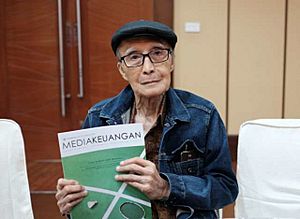Sapardi Djoko Damono facts for kids
Quick facts for kids
Sapardi Djoko Damono
|
|
|---|---|
 |
|
| Born | 20 March 1940 Surakarta, Dutch East Indies |
| Died | 19 July 2020 (aged 80) South Tangerang, Banten, Indonesia |
| Language | Indonesian |
| Nationality | |
| Genre | Poetry |
Sapardi Djoko Damono (born March 20, 1940 – died July 19, 2020) was a famous Indonesian poet. He was known for writing beautiful, song-like poems. Many people saw him as a leader in this style of poetry in Indonesia. Sapardi passed away in South Tangerang, Banten, after being sick for a while.
Sapardi's Early Life
Sapardi grew up in Surakarta, a city also known as Solo. He went to elementary, junior high, and high school there. From a young age, Sapardi loved to read. He spent a lot of time at the libraries in Solo.
He enjoyed many different kinds of books. These included adventure stories by Karl May and comics by R.A. Kosasih. Sapardi even started a small lending library with his younger sibling in their neighborhood.
Sapardi began writing poems while he was still in high school. After graduating, he moved to Yogyakarta. There, he studied English literature at Gajah Mada University. Later, he earned a higher degree in Indonesian literature. During this time, he also worked in radio and theater. His writing career grew alongside his studies.
Sapardi's Career as a Writer
After finishing university, Sapardi taught in several cities. These included Madiun, Solo, and Semarang. He also spent a short time in the United States. In 1973, he became a full-time teacher at the University of Indonesia. He earned his doctorate from the same university in 1989. By 1993, he became a full professor.
His first book of poems, DukaMu Abadi (Your Eternal Sorrow), came out in 1969. This book focused on a person's feelings about life. Unlike many writers at that time, Sapardi wrote more about human feelings than about big social changes.
In 1974, he published Mata Pisau (Knife) and Akuarium (Aquarium). Later came Perahu Kertas (Paper Boat) and Sihir Hujan (Rain Spell). In 1986, he won the SEA-Write Award for his poetry. This award is given by the ASEAN.
In 1987, Sapardi helped start the Lontar Foundation. This group helps to share Indonesian literature. To celebrate the foundation's start, a collection of his poems called "Suddenly the Night" was released.
Around 1998-1999, Sapardi wrote about the social problems in Indonesia. This was after the New Order government ended. His book Ayat-ayat Api (Verses of Fire) came from this time. Some people didn't like it because it had an angry tone. This was different from his usual calm style.
Some of his most famous works are Hujan Bulan Juni (A June Rain) and Berjalan ke Barat di Waktu Pagi Hari (Walking to the West in the Morning). Hujan Bulan Juni is one of his most loved books. It was published in 1994 and has 95 poems. It includes many of his best poems from 1964 to 1992. Some of these poems were written when he lived in Honolulu, Hawaii, in the early 1970s.
Sapardi also translated many books from other languages into Indonesian. He translated works by famous writers like T. S. Eliot, Kahlil Gibran, and Jalaludin Rumi. His translation of Ernest Hemingway's The Old Man and the Sea is thought to be one of the best in Indonesia.
Sapardi's poems have also inspired music. The famous Indonesian pianist Ananda Sukarlan has created musical pieces from his poems. Several singers have also made albums using his poetry. These include Hujan Bulan Juni (1990) and Becoming Dew (2007). The music duo AriReda also put his poems to music. In film, his poem Aku Ingin (I Want) became a soundtrack for the 1991 movie Cinta dalam Sepotong Roti.
Sapardi was a professor at the University of Indonesia. Because he was so involved with the university, he was sometimes called the 'Professor of Indonesian Poets'. He was also once the dean of a faculty. His poems are still very popular today. In 2010, many people came to a poetry reading for his 70th birthday. People of all ages waited in line to hear his poems.
Awards and Recognition
Sapardi Djoko Damono received many awards for his work. Some of these include:
- The Putera Poetry Award in 1983
- The Jakarta Arts Council Literary Award in 1984
- The SEA Write Award in 1986
- The Achmad Bakrie Award for Literature in 2003
- The Akademi Jakarta Award in 2012
 | Toni Morrison |
 | Barack Obama |
 | Martin Luther King Jr. |
 | Ralph Bunche |

